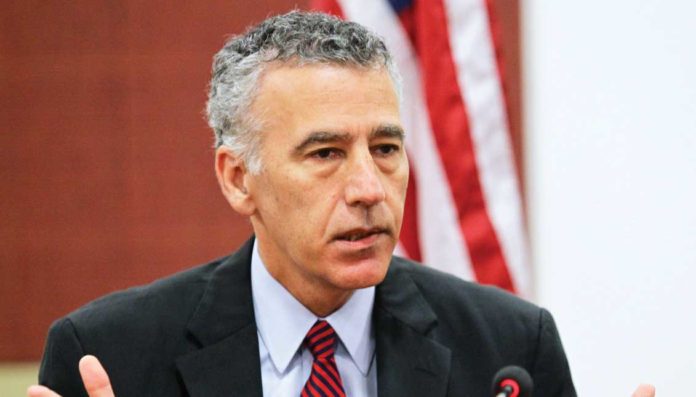Philip Goldberg confronted regional rivalries while ambassador to the Philippines
U.S. President Joe Biden picked career diplomat and former North Korea UN sanctions coordinator Philip Goldberg as ambassador to South Korea, informed sources told the South Korean media Wednesday. The Chosun Ilbo newspaper broke the news, citing multiple diplomatic sources saying that the Biden administration appointed current ambassador to Colombia Philip Goldberg as ambassador to South Korea late last year and asked for Seoul’s agreement to the appointment.
Ambassador Goldberg, who is not well known in South Korea, holds the highest rank of career ambassador at the U.S. Department of State. He served as ambassador to the Philippines from 2013 to 2016 and was later succeeded by Sung Kim, who is now serving as the U.S. Special Representative for North Korea Policy.
According to the U.S. State Department, Ambassador Goldberg’s Washington assignments include Coordinator for Implementation of UN Sanctions on North Korea, acting Deputy Assistant Secretary of State for Legislative Affairs, Executive Assistant to Deputy Secretary Strobe Talbott, and Bosnia Desk Officer and Special Assistant to Ambassador Richard Holbrooke. He was a member of the American negotiating team at the Dayton Peace Conference that ended the Bosnian War.
He served as the coordinator overseeing UN sanctions against North Korea from 2009 to 2010 under President Obama. At that time, he requested that China implement UN Security Council Resolution 1874 and cut strategic assets smuggling into North Korea. It was reported that it was also Goldberg who managed to publicly release those sanctions implementation records to the media at that time.
During Goldberg’s time as ambassador to the Philippines, he managed regional conflict with China, including the Philippines’ disputes with Beijing over the South China Sea. His ambassadorship was marked by occasional conflict with Philippine President Rodrigo Duterte, who at times sought to bring the Philippines closer to China. This experience is relevant in South Korea, which is at the crossroads of the increasing U.S.-China rivalry.
Goldberg has previously drawn the ire of leftist governments, which may mean his appointment will not be welcomed by South Korea’s leftist Democratic Party (DP). While as U.S. Ambassador to Bolivia, he was declared persona non grata and ordered to leave the country in 2008 by socialist Bolivian President Evo Morales. Goldberg and the State Department denied Morales’ accusations that he meddled in violent protests.
South Korean media outlets reported that the Biden administration is about to send a North Korean sanctions expert to South Korea ahead of North Korea possibly resuming high-level provocations. North Korea did not specify what they are about to do, but many speculate that it might resume testing nuclear weapons and intercontinental ballistic missiles (ICBMs).
The appointment of Goldberg is notable considering that sanctions on North Korea have been one of the biggest issues that South Korea and the United States had conflicts on during the Moon administration. The current Moon Jae-in administration continued to argue that the international community should ease sanctions to allow North Korea to come back to the negotiation table or at least allow inter-Korean projects to be run. However, the United States and the international community were firm that North Korea should refrain from all of its illegal activities and show sincere willingness to discuss denuclearization first.
In fact, the U.S. State Department reaffirmed that its goal of complete denuclearization of the Korean Peninsula has not changed. When asked whether the United States plans on changing its policies to engage with North Korea, which held its fifth missile test of this month on Tuesday, Spokesperson Ned Price answered, “It is a policy that was formulated in the early days of this administration that we developed in close coordination with our allies and partners, especially the Republic of Korea and Japan,” during the press briefing on Tuesday. “We’ve had a number of engagements with them in the trilateral format, knowing the importance of trilateral cooperation when it comes to that ultimate goal and that’s the complete denuclearization of the Korean peninsula.”
According to Reuters, a spokesman for the U.S. Embassy in Seoul said they had no announcements to make at this time, and that any formal notification would come from the White House.
The presidential Blue House told the media that the ambassador nomination is not something that the South Korean government should announce. But the official added that “we can confirm that we have been notified of information about the ambassador appointee.”
The post in one of the United States’ key allies has been filled by Charge D’affaires ad interim Christopher Del Corso for more than a year since the last ambassador to South Korea, former navy admiral Harry Harris, stepped down as Biden took office in January 2021.
The White House has not yet publicly announced the appointment. Once it is announced, it would go through a Senate confirmation hearing. This process normally takes around two to three months, but Biden’s ambassadorial nominees are facing unprecedented delays in the Senate. This means that the new ambassador will likely begin his work with the new South Korean administration, which will take over in May.



